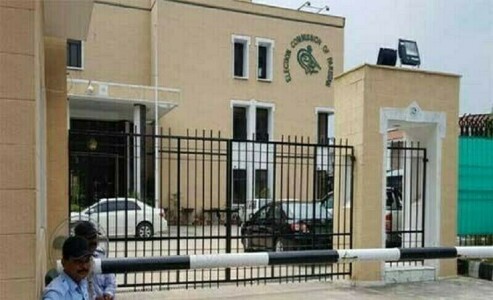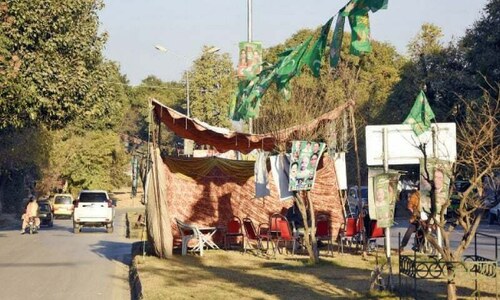President Arif Alvi on Sunday refused to sign off on an amendment bill that would raise the number of existing union councils in Islamabad, saying the move would “further delay local government elections”.
The move comes a day after the Election Commission of Pakistan (ECP) flouted court orders to hold local government elections on Dec 31, triggering a fresh round of litigation.
In a statement released by the President’s Secretariat, President Alvi “returned unsigned the Islamabad Capital Territory Local Government (Amendment) Bill, 2022 in terms of clause (1) (b) of Article 75 of the Constitution”.
The amendments propose the number of union councils in the Islamabad Capital Territory be increased to 125 from the existing 101. It also allows for the mayor and deputy mayor to be directly elected as joint candidates by the voters.
It was passed by the National Assembly on Dec 22 and the Senate the following day, requiring only the president’s assent for the bill to be signed into law.
In the president’s statement, the bill was returned by observing that it would further delay the local government elections.
“Actions of the federal government taken in hurry resulted in delaying election process twice, which was anathema to democracy,” the statement said.
It added that elections could not be held in Islamabad Capital Territory (ICT) due to the following “malafide actions” of the federal government.
After the completion of delimitation of 50 union councils, Alvi said, the ECP announced elections of local government in ICT on July 31, 2022.
“Despite announcement of polling date, federal government increased number of union councils from 50 to 101, resulting into postponement of elections,” he added.
After demarcation of 101 Union Councils, the president said, the ECP decided to hold elections in ICT on December 31, 2022. “Section 2 of current Bill provides for 125 Union Councils in the ICT. Therefore, elections scheduled for 31st December 2022 have been again postponed.”
He added as per Section 3 of current bill, the mode of elections of the mayor and deputy mayor has been changed after the announcement of the schedule of elections.
Litigation
In the latest row, the federal government challenged the “hasty” decision of the IHC, and the ECP explained in writing to the court reasons for its inability to hold the polls yesterday.
The opposition PTI, meanwhile, sought contempt proceedings against both — the government and the election watchdog.
Besides, IHC Justice Arbab Muhammad Tahir released the detailed order passed a day earlier on the petitions of PTI and Jamaat-i-Islami (JI) seeking directions for the ECP to hold the elections on Dec 31.
The court in the detailed judgement noted that “the decision of the federal government to increase the number of UCs [union councils] from 101 to 125 was based on a summary moved by the Special Secretary, Ministry of Interior.
However, neither in the summary [prepared] for the Cabinet, nor the Notification dated Dec 19, 2022 [is] mention[ed] any cogent reason [for increasing the number of UCs].
The court observed that ECP had issued the election schedule on Oct 20. Thereafter all the process required for the conduct of election was completed by the ECP. The polling day, as per the schedule, was Dec 31.
“The Federal Government was aware of the schedule, however, at fag end, issued the notification dated Dec 19, based on unconfirmed statistics/information provided by the Administrator Municipal Corporation of Islamabad (MCI), in haste without realising that elections are going to be held after twelve days,” the court order said and added “the conduct portrayed by the Federal Government appears to be in conflict with the law on the subject.”
“It can also be witnessed from the fact that despite specific direction, the exclusive response in black and white was not tendered enabling the Court to adjudge the reasons made basis to enhancement of the UCs and when no response has been put forth, there would be no other presumption but to hold that it had no reason to put.”
Intra-court appeal
The federal government filed the intra-court appeal through Additional Attorney General Munawar Iqbal Duggal.
The government in its appeal, to be heard by a two-member division bench next week, stated that the single-member bench “has proceeded in haste to pass the impugned order…as writ petitions [of PTI and JI] were instituted on Dec 28 and were taken up for hearing…the same day and [court] issued notices to the Respondents for Dec 29 for taking up at 2:30pm”.
According to the appeal, the government was not given adequate time to file written reply to these petitions and the court announced its judgement.
It further said that the judge treated the ECP as an executive body and directed the commission to hold elections. The ECP, it pointed out, is a constitutional forum.
Commission’s explanation
The ECP, in the appeal against the IHC order, explained its activities after the court had issued a notice to them on Dec 28.
It states that the Constitution empowered the commission to “organise and conduct elections and also to make such arrangements as are necessary to ensure that the election is conducted honestly, justly, fairly and in accordance with law”.
The ECP states that upon receipt of the IHC’s Dec 29 direction, “the Special Secretary ECP along with his legal team met with the Attorney General of Pakistan for consultation. The Attorney General contacted the Minister for Law and Justice Division telephonically…the AG conveyed the stance of the ECP to the Minister and over telephone who agreed [to] the conduct of elections within 04 months”. According to the ECP, “Attorney General also contacted Secretary Ministry of Interior over telephone and told him to hold meeting with ECP officers regarding the timeframe”.
It said that ECP is ready to hold the elections in 120 days, adding that two months are required for delimitation, 10 days for printing of electoral rolls and 50 to 55 days for the conduct of elections subject to provision of necessary assistance, maps, and data, etc.
The commission stated that the single-member bench did not realise that the elections were not possible in the given circumstances as the ballot papers were lying with the Printing Corporation of Pakistan and the election process requires a number of tasks to be completed, including deployment of 14,000 polling personnel to perform duties at 1,039 polling stations and 3,088 polling booths.
The ECP said it also required mobilisation of over 1,000 vehicles for the elections days.
Explaining the last-ditch effort to hold the elections on Dec 31, the commission stated that following the pronouncement of the IHC’s order, the ECP “approached the Secretary Interior Division on phone to provide security arrangements and necessary logistics support. The Secretary Interior Division expressed inability to render such support”, adding that “this request has also been made vide letter dated Dec 30, 2022 through special messenger and fax. The reply thereof is awaited.”
PTI’s plea
In its petition seeking contempt proceeding against Chief Election Commissioner, ECP members and secretaries of interior and cabinet divisions, the PTI states that they [respondents] were “very well aware of the unambiguous and clear directions” of the IHC.
However, they “failed to adhere to the directions and despite being a regulator utterly failed to fulfil and perform its constitutional obligation and duty of holding elections on Dec 31, 2022”.
The PTI says the ECP’s stance that the secretary interior had expressed inability to render support is an admission that the federal government flouted the court’s direction despite the fact that there was clear direction of providing all the support to the commission for conduct of LG elections.
It requested the court to initiate contempt of court proceedings against the ECP and the secretaries of interior and cabinet divisions for disobeying the orders.














































